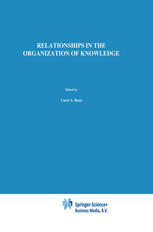

Most ebook files are in PDF format, so you can easily read them using various software such as Foxit Reader or directly on the Google Chrome browser.
Some ebook files are released by publishers in other formats such as .awz, .mobi, .epub, .fb2, etc. You may need to install specific software to read these formats on mobile/PC, such as Calibre.
Please read the tutorial at this link: https://ebookbell.com/faq
We offer FREE conversion to the popular formats you request; however, this may take some time. Therefore, right after payment, please email us, and we will try to provide the service as quickly as possible.
For some exceptional file formats or broken links (if any), please refrain from opening any disputes. Instead, email us first, and we will try to assist within a maximum of 6 hours.
EbookBell Team

4.7
36 reviewsRelationships abound in the library and information science (LIS) world. Those relationships may be social in nature, as, for instance, when we deal with human relationships among library personnel or relationships (i. e. , "public relations") between an information center and its clientele. The relationships may be educational, as, for example, when we examine the relationship between the curriculum of an accredited school and the needs of the work force it is preparing students to join. Or the relationships may be economic, as when we investigate the relationship between the cost of journals and the frequency with which they are cited. Many of the relationships of concern to us reflect phenomena entirely internal to the field: the relationship between manuscript collections, archives, and special collections; the relationship between end user search behavior and the effectiveness of searches; the relationship between access to and use of information resources; the relationship between recall and precision; the relationship between various bibliometric laws; etc. The list of such relationships could go on and on. The relationships addressed in this volume are restricted to those involved in the organization of recorded knowledge, which tend to have a conceptual or semantic basis, although statistical means are sometimes used in their discovery.